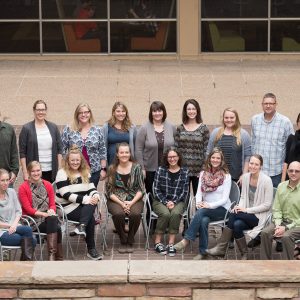Those of us out of school 10 or more years, may have vague recollections of our college advisor. It may have been a faculty member or a staff member, and the relationship may have been nothing more than reviewing a check sheet and getting a signature. But times have changed. Technology allows students and advisors to closely monitor progress to degree. And since 2009, advising has become a professional position at CSU in the form of the Academic Success Coordinator (ASC).
“In 2006 when Dr. [Tony] Frank was provost, he asked us to look at what we could do to improve student retention and success. We learned early on that no one thing would work and we would need a comprehensive strategy,” said Paul Thayer, special assistant to the provost for retention and associate vice president emeritus.
That charge kicked off the Student Success Initiatives in 2007, lead by Thayer, and one element of those initiatives was advising. And to enhance the impact of advising, the role was professionalized, done by people hired specifically to fulfill that role.
“There has been a lot of attention and resources given to making sure students have an intentional experience around completing a degree at CSU,” says Amy Dinise-Halter, student success project manager with Academic and Student Affairs. “Dr. Frank has charged us with creating the university of the future and student success is a big part of that.”
The ASCs work with students on everything from degree completion and graduation plans to resources for conflict resolution or counseling or roommate issues.
“The term that a lot of students use is “adulting,”” says Elizabeth Terry-Emmot (’00, ’02, ’07), director of the Advising Center for the College of Liberal Arts. “We help them learn how to manage their lives, to take responsibility for their actions and to be empowered in their academic career choices.”
As director, Terry-Emmot oversees 15 ASCs, each of whom focuses on one to two specific departments or programs (there are 16) within the college. “Prior to this model, there were some inconsistencies in advising around many aspects of a student’s academics and the all-university core curriculum. Now, a student meets with one person for their major for all four years of their degree, their ASC, who is trained in and focused on advising the whole student from start to finish.”
ASCs don’t do “prescriptive advising” where they just tell students which classes to take. Instead, they have conversations. “We help the student lead the conversation, talk to them about their classes and what their interests are, suggest other opportunities (like double majors and minors), study abroad, internships, career exploration, and we help connect students to resources to help them learn to manage their life while in school,” says Terry-Emmot.

The Benefits
In addition to helping students chart their academic course, the ASCs help them feel comfortable. “We help normalize the academic experience,” says Terry-Emmot. “Lots of students struggle with the first semester because the transition is hard. The balance between social life and academics is huge. They have new friends and new options. We have discussions about balance, we connect them to resources to help them develop a schedule for studying, and we talk to them about how to say yes to some things and no to other things if they interfere with their academics.”
This comprehensive approach to a student’s collegiate experience ultimately helps with retention because the ASC can help the student navigate the system and help them with a variety of issues they may have while in college.
“ASCs are a critical part of the support network to students,” says Dinise-Halter. “Part of a student’s sense of belonging is making meaningful connections across campus, and that includes professional staff.”
Though the technology – such as an online catalog and degree audit – assists with offline tracking and monitoring, it doesn’t replace the need for and value of a face-to-face conversation with an ASC. “Students are more technologically focused, and that technology allows them to not talk to people, or to avoid office hours,” says Terry-Emmot. “But the issues are the same related to brain and human development: issues with transition and worry about what they’re going to do with their lives.”
And it is with these issues of human development that the ASCs provide significant value. The ASC must be passionate about helping students, knowledgeable about the policies, resources, and opportunities on campus, committed to those from diverse backgrounds, and extremely detail-oriented to handle a caseload of 300-370 students per semester (more than 4,000 students are majoring in the liberal arts). In addition, ASCs for the College of Liberal Arts talk with students regularly about the skills they are learning in their majors. “Leadership, critical thinking, communication skills, flexibility, group work,” says Terry-Emmot. “We help students start thinking about how they are learning these skills in their classes, and that they will use these skills in their future careers.”
Student Success and New Strategies for the Future
ASCs are on the forefront of better ways to engage students and are working with text messaging and the online learning management system, Canvas, to communicate with students about their status and progress. Starting in fall 2017, the ASCs will use an advising syllabus that explicitly lists the learning outcomes from the academic advising and planning they will do over the course of their academic career here. “We are hoping that by using as advising syllabus, we can help students understand what their role is in their own development of the skills they will need to be successful in college and in life,” says Terry-Emmot.
“There is intentionality and a strategic approach to what we do,” says Dinise-Halter. “CSU is often looked to nationwide as a leader in student success, and that should be a point of pride for alumni.”
Portions of this article were taken from Source.
